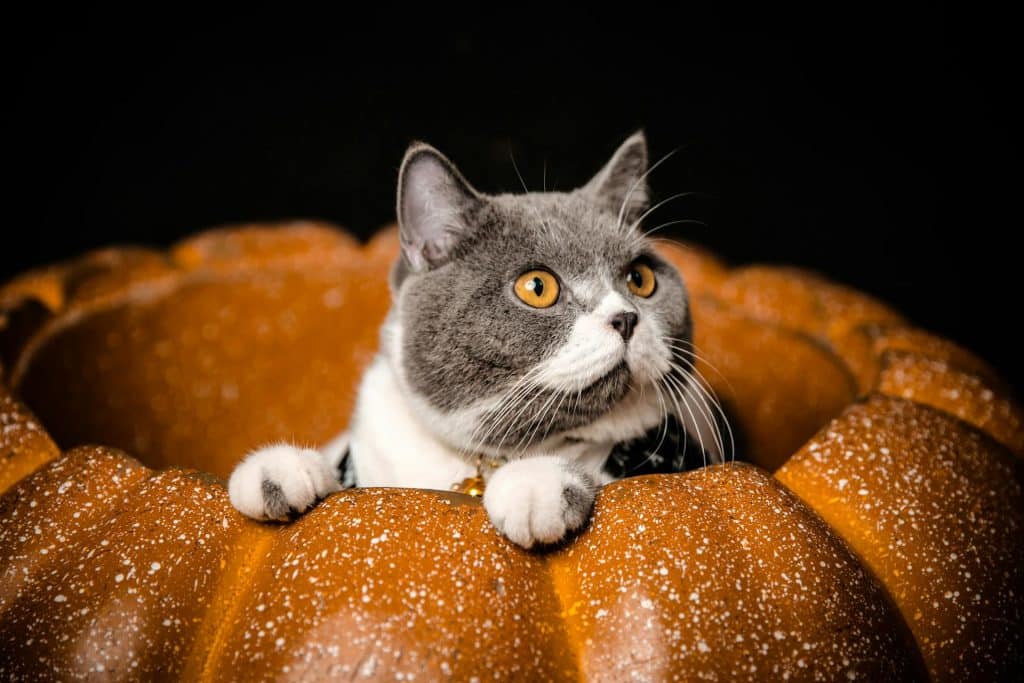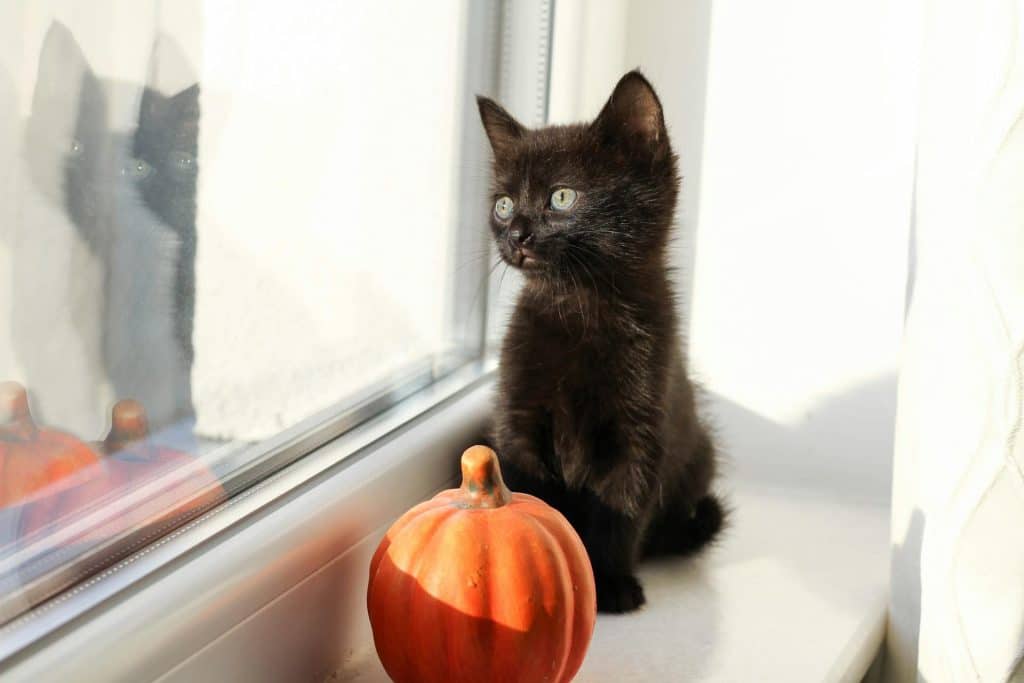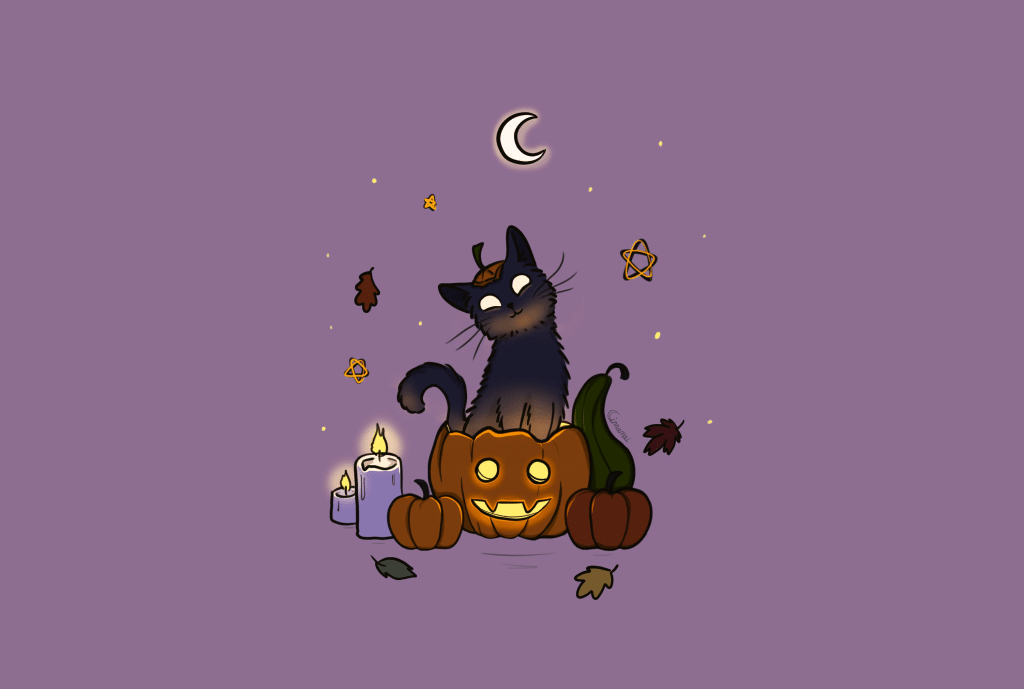In the spooky season of October, pumpkin becomes a popular dish on our table. But can cats eat Pumpkin? Let’s find out!
This vegetable is an iconic symbol of autumn and holidays. We consume it in all shapes and forms. Pumpkin spice latte, pumpkin cream soups, pumpkin pie and many more. This vegetable is versatile and is full of benefits for us. But can our furry friends share the benefits of this orange veggie? In this article we will go through all kinds of benefits that pumpkin has for our feline companions.
Benefits of Pumpkin for Cats
Pumpkin isn’t just a seasonal treat for us. It has many benefits for cats as well. Pumpkin is full of essential nutrients like fiber, vitamins A, C and E, potassium and iron that can support your cat’s health. The high fiber content in pumpkin is especially beneficial for your cat’s digestive system, helping regulate bowel movements and improve overall gut health. For cats that often experience stomach issues, even a small amount of pumpkin can often make a noticeable difference. Pumpkin is great with easing issues like constipation or diarrhea.
Moreover, the vitamins in pumpkin support your cat’s immune system. The potassium and iron content aid in muscle function and maintaining healthy blood cells. This nutrient profile makes pumpkin a helpful addition to your cat’s diet, particularly for digestive support. Some vets even suggest pumpkin as a remedy for mild digestive issues due to its natural fiber content and gentleness on a cat’s stomach.
Our kitties might also occasionally have hairballs, and pumpkins can help with that too. As feeding your cat pumpkin doesn’t require medications or supplements, this is an easy option and a holistic health solution for your pet.
Is Pumpkin Good for Cats?
Pumpkin can be a good supplement for cats, but it’s important to give it to them in the right way. Cats are natural carnivores, meaning they need animal-based nutrients as their primary food source. Of course, pumpkin is not a substitute for their meat diets, but it is certainly a positive addition to their gut health if given in small amounts. Its fiber and moisture content can enhance a cat’s health, especially when they experience digestive issues.
The added fiber from pumpkin can be particularly beneficial for indoor cats or older cats that may not be as active or hydrated as they need to be for optimal digestion. However, not every cat will benefit from pumpkin, so monitor their response to this new food carefully, and consult with your veterinarian if you have any concerns. Keep in mind, our furry friends don’t need as many veggies as we do on a daily basis!
Pumpkin also adds hydration to your cat’s diet, which is helpful if your cat is not drinking enough water. Cats tend to have a low thirst drive compared to other animals, so adding moist food sources can help maintain their hydration levels. By adding pumpkin, you are introducing an additional source of water that may help them in urinary health and prevent issues like urinary tract infections or kidney strain.
Can Cats Eat Pumpkin?
Yes, cats can absolutely eat pumpkin and it offers various benefits when added to their diet in moderation. Pumpkin is a safe, nutrient-rich vegetable that can aid in digestive health, weight control, and hairball management. However, it’s essential to know the correct types, portions, and ways when it comes to feeding pumpkin to your cat. Below, we’ll cover everything you need to know about feeding pumpkin to your cat, from its benefits to potential drawbacks. If you’d like to also know about if cats can eat honey check out our article Can Cats Eat Honey Or Should They Stay Away?
How Much Pumpkin Can I Give My Cat?
The amount of pumpkin you should give your cat depends on their size, age, and health needs. Cats can eat pumpkin in moderate amounts. A general guideline is to start with 1/2 teaspoon of pure, canned pumpkin or freshly cooked pumpkin. Add half a teaspoon to their portion of food per day for smaller cats, and up to 1 tablespoon for larger cats. You can mix this amount into their regular food.
It’s important not to overdo it, as too much fiber can cause a stomach upset or nutrient imbalance. If your cat is adjusting well, you can offer a small amount daily or a few times a week. Always consult with your vet if you’re unsure about the proper portion size for your cat.
Serving Tips
To encourage your cat to try pumpkin, consider mixing a small amount with their favorite food. You can also freeze small portions of pureed pumpkin in an ice cube tray, which some cats may find more appealing, especially during warm months. Be patient if your cat is reluctant at first – some may take time to get used to the texture or taste of pumpkin, especially if they’re new to vegetables.
Another tip is using the “sandwich method”. If you are feeding your cat wet food, add half of the usual portion to the plate first. Then add a little bit of pumpkin. And then top it off with the rest of the wet food to “cover” the new texture and smell. Sensitive cats may be more receptive to this new addition this way.

Can Cats Eat Pumpkin Raw?
Cats can eat raw pumpkin, but it’s usually better to cook it first. Raw pumpkin is actually harder for cats to digest and may cause stomach upset or irritation in some cases. Cooking the pumpkin softens it and makes it easier to blend into their food, allowing them to absorb the nutrients more easily.
If you choose to feed raw pumpkin to your cat, ensure it’s fresh and finely chopped, but most experts recommend feeding cooked pumpkin as it’s gentler on your cat’s digestive system.
Important: Avoid giving your cat any unprocessed pumpkin parts like the stem or rind, as they can be difficult to digest. In cases where fresh pumpkin is not available, plain, canned pumpkin (without added sugars or spices) is a suitable and convenient alternative.
Can Cats Eat Pumpkin Seeds?
Pumpkin seeds can be a safe snack for cats, only if they are prepared correctly. Raw seeds should be cleaned, roasted, and unsalted before feeding to your cat. Pumpkin seeds are rich in antioxidants, healthy fats, and protein, making them a nutritious treat. However, ensure the seeds are unsalted and given in tiny amounts, as excessive anything could lead to an upset stomach.
Feed pumpkin seeds sparingly, as they are calorie-dense and should only be a small part of your cat’s diet. Grounding the seeds into a fine powder and sprinkling a small amount on your cat’s food is a more practical way to offer the health benefits without the risk of choking. Some cat owners find that a small, occasional serving of pumpkin seeds can be a fun way to treat their cats to something different while providing essential nutrients.
Pumpkin for Cats With Diarrhea
All the fiber in pumpkin can help to manage diarrhea in cats, by absorbing excess water in their digestive tract. This can firm up their stool. If the diarrhea is mild you could try adding a little bit of pumpkin to the cat food. However, persistent diarrhea requires a vet visit to rule out underlying issues.
Pumpkin for Cats With Constipation
Pumpkin is a 2-in-1. Almost as any vegetable, the fiber content can also help with constipation, as it adds bulk to the stool and encourages regular bowel movements. A teaspoon of pumpkin added to their food can provide the necessary fiber for cats struggling with infrequent or hard stools. Just be careful not to add too much, as excessive fiber may worsen constipation.
Pumpkin for Weight Control
For our chonky feline friends, pumpkin can be an excellent low-calorie filler. It adds more to their meals without the extra calories, which can help them feel full easier. By replacing a small portion of their regular food with pumpkin, you can help reduce their overall calorie intake while ensuring they remain satisfied.
Pumpkin for Cats With Hairballs
Hairballs are a common issue for many cats, and feeding your cat some pumpkin can help by improving the digestive movement and reducing the buildup of swallowed fur. The fiber in pumpkin helps move fur through the digestive tract more easily, minimizing the formation of hairballs.

Is Pumpkin a Natural Dewormer for Cats?
While some claim that pumpkin seeds can act as a natural dewormer due to their cucurbitacin content, which may paralyze parasites, the question has mostly been studied in birds. A lot of studies conclude that there is no evidence to back up the saying that pumpkin or pumpkin seeds could be a natural dewormer. For a more detailed view of the study check out the following article: Does Pumpkin Seed Work as a Dewormer?
Some sources mention that feeding pumpkin to your cat is somewhat effective against only a specific type of worm, a fluke worm found in frogs and snails. If you’re looking for natural parasite control, pumpkin seeds may not be an effective solution.
For effective deworming, consult your vet for approved treatments instead. This way the cat will not suffer for long from these nasty parasites.
Are There Any Negatives To Feeding Cats Pumpkin?
Though pumpkin can offer health benefits, there are potential downsides to be aware of. If your cat eats too much pumpkin, it can lead to digestive issues, such as diarrhea or an upset stomach. High fiber intake can sometimes interfere with nutrient absorption or contribute to bloating, so it’s crucial to keep the servings moderate.
Additionally, feeding your cat overly sweet or flavored pumpkin products, such as pumpkin pie filling or spiced pumpkin treats, can definitely harm your cat’s health. These items often contain sugars, spices, and additives that are not safe for cats and should be avoided. No pumpkin-spiced latte for your cat!
Can Cats Eat Pumpkin Pie?
No, cats should not eat pumpkin pie. While plain pumpkin is safe, pumpkin pie contains sugar, spices, and often dairy, which are not healthy for cats. Ingredients like nutmeg are toxic for cats, causing stomach upset or even serious health complications in large amounts. If you want to treat your cat with pumpkin, stick to plain, unsweetened pumpkin puree.
Can Diabetic Cats Eat Pumpkin?
Yes, diabetic cats can also eat pumpkin in moderation, and it may even offer some health benefits. Since pumpkin is a low-calorie, low-sugar vegetable that provides fiber, feeding pumpkin to your cat can help regulate blood sugar levels by slowing digestion and preventing spikes in glucose. The fiber in pumpkin is beneficial for diabetic cats who may experience digestive issues more frequently due to their condition. Since pumpkin is low on the glycemic index, it typically won’t cause sudden sugar spikes, making it a safe supplement for most diabetic cats.
However, it’s essential to be cautious with portion sizes and consult your veterinarian before adding pumpkin to a diabetic cat’s diet. Too much pumpkin can potentially disrupt nutrient absorption which may complicate diabetes management. Same as for healthy cats, use unsweetened pumpkin puree without any added spices. You can’t be too cautious when it comes to a diabetic cat’s diet. If you’d like to know more about supplementing a diabetic cat’s daily food, check out Best Supplements for Diabetic Cats in 2024.
How Your Cat Can Eat Pumpkin Safely
Feeding pumpkin to your cat is simple with a few precautions. Ensure you use plain, unsweetened canned pumpkin or cooked pumpkin without any spices. You can mix a small amount into your cat’s regular food or serve it as a treat on its own. Avoid using flavored or spiced pumpkin products, as these are often harmful to cats.
If you choose fresh pumpkin, remove the seeds and bake or steam the flesh until soft. Mash or puree it before offering it to your cat, and store any leftovers in the refrigerator for a few days, or freeze small portions for later use. Always start with a small portion and observe your cat’s reaction to ensure they tolerate it well.
Summary
To conclude, pumpkin is a perfect delight you can share with your cat during the fall months. Cats can eat pumpkin as it provides fiber, vitamins, and moisture that support digestive health and help with issues like diarrhea, constipation, hairballs, and even weight control. While it should only be offered in moderation, feeding pumpkin to a cat is a healthy supplement to their regular diet. If you’d like to know what other foods cats can eat, check out Cat Health 101: Can Cats Eat Mango?
Remember to avoid all flavored pumpkin products and consult your vet if you have questions about the best way to include pumpkin in your cat’s feeding routine. By following these suggestions, you can safely offer your cat the health benefits of pumpkin while steering clear of any potential risks. Happy spooky season!


